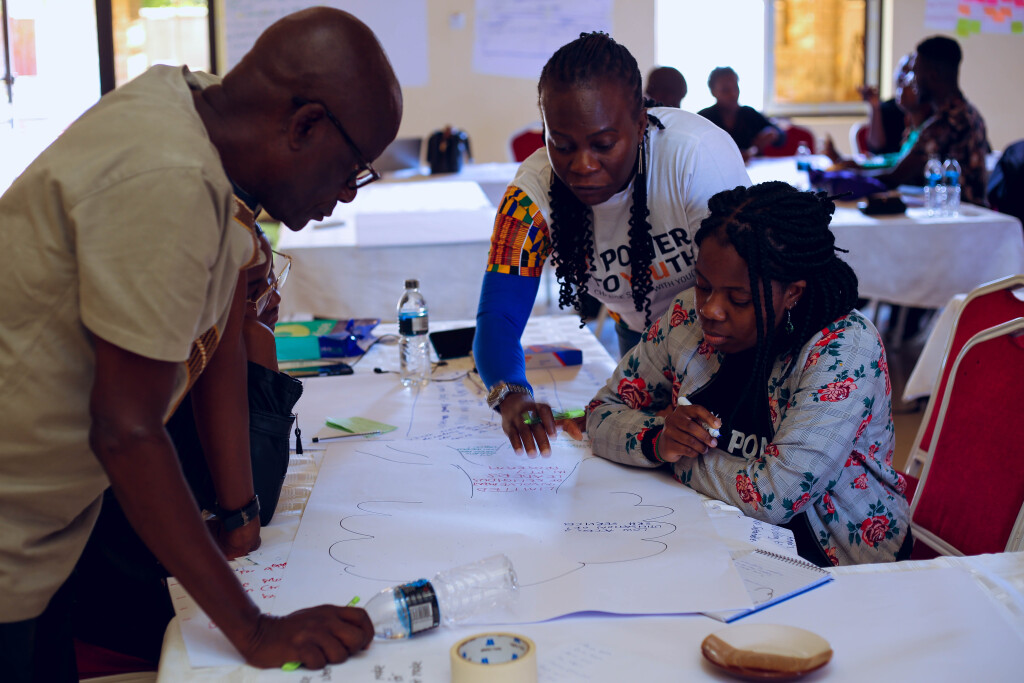
Power To You(th) (Malawi Innovation Challenge)
Situation
Amongst numerous cultural practices in Malawi, Initiation Ceremonies (ICs) are the most profoundly celebrated ceremony. These ICs are conducted in initiation camps where children, Adolescents (ABYM&AGYW), are taught age-inappropriate sexual information. This leads to early sexual debut, teenage pregnancies, distortion of healthy sexual behaviour, and vulnerability to exploitation/abuse. The community is seen to be very traditional with deeply rooted harmful social norms playing a significant role in perpetuating harmful practices and cultural norms that adversely affect young people. Some of the areas where these harmful norms manifest include:
- Normalization of Harmful Practices: These include Initiation Ceremonies (ICs) that teach age-inappropriate sexual information, often leading to early sexual debut, teenage pregnancies, and vulnerability to exploitation/abuse.
- Deeply Rooted Social Norms: These norms enforced by community leaders and elders, who hold positions of authority within traditional structures, hinder young people from making informed decisions about their reproductive health.
- Traditional Cultural Norms: These norms dictate rigid roles and expectations, relegating young people to subordinate positions within the community and limiting their access to accurate and age-appropriate sexual information.
- Community Attitudes: Attitudes among law enforcement officials, traditional leaders, and community members result in downplaying the effects of these harmful practices and pressure to conform to these norms, rather than challenging and changing them.
We conducted an Innovation trajectory through the Power to You(th) consortium in Malawi in implementing this project, using a Human-Cantered Design (HCD) approach, the project aims to create a solution that is not only effective but also community-cantered as well as culturally sensitive while transforming how initiation ceremonies are done suing Machinga and Dedza districts as user-cases for Malawi. The focus is on understanding and addressing the harmful social norms that hinder young people in Malawi from making informed decisions about their reproductive health. The project operates within this unique socio-cultural context, with the PtY Malawi innovation team engaging in an interactive design approach (using HCD) to research and investigate aspects of negative issues/pain points that require solutions. Together with the community stakeholders, the team developed a “How Might We” hypothesis, outlined research questions, and engaged with primary targets in communities in Dedza and Machinga districts where ICs are predominantly practiced. The team collected insights from observations, interviews and desk research, structured them according to user targets, and mapped them on Miro. Then entered the design sprint stage, which started with an exercise to highlight the relevance of putting the end user at the centre of design through the design sprint process. This approach emphasizes the importance of designing with the user rather than for the user.
Assignment
The problem we are trying to solve in the communities of Dedza and Machinga districts in Malawi revolves around the persistence of harmful cultural practices, such as Initiation Ceremonies (ICs), which disproportionately affect Adolescents (ABYM & AGYW). In these communities, deeply rooted social norms influence harmful practices. Despite various interventions and awareness efforts, these practices persist due to these deeply rooted cultural beliefs. The overarching goal is to eradicate these harmful practices and create a community where young people are empowered to make informed decisions about their reproductive health. The design challenge was formulated as,
“How might we engage key stakeholders in the development of an initiation curriculum that addresses harmful practices, fosters Comprehensive Sexuality Education (CSE), respects cultural values, and empowers adolescents to fully realize their sexual and reproductive rights?”
This formulation highlights the importance of actively involving all stakeholders, including initiators, parents, Adolescents (ABYM&AGYW), chiefs, CSOs, and Government, as allies and agents of change in addressing entrenched cultural norms and practices that perpetuate harm against young people. It emphasizes the need to promote positive cultural values, challenge harmful social norms, and foster a supportive community environment where all stakeholders play a proactive role in promoting reproductive health rights and ending harmful practices. The client’s assignment required the team to work directly with the targeted users and stakeholders. To achieve this, the PtY Malawi team conducted interactive workshops across the Dedza and Machinga districts. These workshops aimed to train staff and youth on innovative thinking and Human-Centered Design (HCD) methodologies. From the outset, the team adopted a co-creation and co-design approach with the stakeholders. This began with an initial research and sense-making phase, during which they developed a “How Might We” hypothesis. They outlined research questions and methodologies and engaged with primary targets in communities where Initiation Ceremonies (ICs) are predominantly practiced. To ensure sustainability and continuity, the team devised a comprehensive plan. This included providing online monitoring support to district youth officers and stakeholders, thereby bolstering work on the ground in the two districts. The team adhered to the approved proposal in delivering the training and subsequently compiled a detailed report encompassing observations and recommendations. Throughout the process, the team was available for proposal clarifications and provided unwavering support to the communities during the innovation challenge. This approach ensured a coherent, unique, and community-centered solution to the challenges faced in the Dedza and Machinga districts of Malawi.
Approach
Our approach was deeply rooted in the principles of the HCD process. This methodology, which places the user at the heart of the design process, was pivotal in addressing the sensitive issue of initiation ceremonies in Machinga and Dedza. The HCD process ensured that the communities felt not only respected and listened to, but also actively involved throughout the innovation trajectory. Cultural Sensitivity The cultural sensitivity surrounding ICs presented a significant challenge. Open discussions and questioning of the harmful practices associated with them were difficult. However, the HCD process provided a platform for respectful and inclusive engagement with the communities. We collaborated closely with the chiefs, who served as community gatekeepers, the adolescent girls who had undergone these initiations, and various stakeholders. This co-designing process ensured that our research was not extractive but was driven by the community’s agenda, aligning with the ethos of the PtY Malawi team. HCD Process The HCD process unfolded in several phases:
- HCD Sensitization: The PtY Malawi team underwent a two-day HCD workshop, setting the project’s tone and pace. A pre-survey assessed the team’s HCD knowledge, shaping the workshop’s expectations. The team familiarized themselves with the HCD process and tools, practicing for easy application during the project. They identified an initial challenge to address, using an impact/effort matrix to define three top challenges. Teams were formed to tackle these issues, each developing a problem tree and presenting it for collective engagement and selection. The team chose to address harmful social norms, posing the question: “How might we ensure young people are shielded from deeply ingrained harmful social norms, enabling them to make informed decisions about their SRH?” The team agreed to conduct this work in Machinga and Dedza.
- Discover Stage: The team invested time in understanding the issues surrounding ICs in Malawi. This involved desk research, initial interviews, surveys, and the creation of preliminary personas and journey maps. The team then conducted a two-week field research in Dedza and Machinga, observing and visiting initiation camps (with permission and accompanied by chiefs), conducting interviews, and holding focus group discussions with various community groups. This immersive experience allowed the team to validate assumptions and gain firsthand knowledge of the issues surrounding ICs. The research was iterative, with regular check-ins with the Proportion coach to adapt the discussion guides as new issues emerged. Upon returning from field research, the team held a debriefing workshop to brainstorm and curate data using sticky notes, Miro, and flip-charts. They developed empathy maps, personas, and journey maps for all user segments, exploring pain points for adolescents, mothers, parents, and chiefs. The team prioritized these pain points based on several factors:
- 1) Severity of Impact: The team considered how severely the pain point affects the user segment. The more significant the impact, the higher the priority.
- 2) Frequency of Occurrence: Pain points that occur more frequently were given higher priority as solving these could potentially benefit the user segment more regularly.
- 3) Feasibility of Solution: The team also considered how feasible it is to address the pain point. If a solution is relatively easy to implement and has a high impact, it was prioritized.
- 4) Alignment with Goals: Pain points that are closely aligned with the project’s goals and objectives were given higher priority.
- 5) Stakeholder Input: The team took into account the input from various stakeholders, including community members, chiefs, and adolescents. Their perspectives provided valuable insights into which pain points are most critical. This informed the ideation process and kick-started the prototyping process to develop potential solutions to the identified challenge. Miro was extensively used to foster team participation in the process. The prioritization process was iterative and dynamic, requiring continuous learning and adaptation as the team gained a deeper understanding of the user segments and the issues they faced. This approach led to more robust and community-driven solutions.
- Create Phase: During the Create phase, the PtY Malawi team engaged in a highly interactive Design Sprint just outside the capital city, Lilongwe. This phase is a crucial part of the HCD process, where prototypes are continually developed, tested, and refined to ensure that the solutions truly meet the needs of the people. Representatives from the communities in Machinga and Dedza, including chiefs, AGYWs, adolescents, district youth officers, and other stakeholders, were invited to participate in the testing and refining of the prototypes. This active involvement of actual users in the feedback process is a fundamental pillar of HCD, ensuring that the solutions address real human needs and desires. While working on a design challenge “How might we engage key stakeholders in the development of an initiation curriculum that addresses harmful practices, fosters Comprehensive Sexuality Education (CSE), respects cultural values, and empowers adolescents to fully realize their sexual and reproductive rights?” The team synthesised research insights and the design challenge then started with low-fidelity prototypes, which are simple and often non-digital versions of the solution that are quick and cheap to make. These prototypes were then tested with the users, and their feedback was incorporated into the design. This iterative process of user feedback and prototype refinement is a key aspect of HCD, allowing the design to evolve based on user needs. As the prototypes were refined based on user feedback, they gradually evolved into medium-fidelity prototypes. These prototypes are more detailed and closer to the final product, providing a better representation of the user experience. The selection of the best solution was based on its feasibility, desirability, viability, and cultural sensitivity to the needs and beliefs of the people in the two districts. This made the process more user-cantered, ensuring that the solution was not only technically feasible but also desirable for the users and viable from a business perspective. The Create phase culminated in the preparation for the pilot proposal submission, with the medium-fidelity prototypes ready to be presented to potential funders. This phase demonstrated the power of HCD in turning ideas into reality and creating solutions that truly meet the needs of the users.
- Pilot Proposal Stage: The team, together with their Proportion coach, compiled the work that highlighted the methodology into a visually appealing slide deck that told a story using personas and journey maps to guide the innovation process from start to finish. The proposal clearly highlighted the design challenge and included all the feedback from the stakeholders, the prototypes, and how they were refined. It also incorporated a sustainability model for the project, while incorporating risks and their mitigation measures. The proposal was then pitched for potential funding for a pilot project. Throughout this process, the team utilized various tools, including Miro for insight generation and a shared Google Drive for updating and accessing research materials. This approach fostered effective teamwork and creative problem-solving, leading to more robust and community-driven solutions.
Results
- Community Engagement: The project successfully engaged key stakeholders in the community, including initiators, parents, adolescents, chiefs, CSOs, and government officials. This inclusive approach fostered a sense of ownership and commitment to the project’s goals.
- Prototypes: The team developed low-fidelity and medium-fidelity prototypes that were tested and refined based on user feedback. These prototypes provided a tangible representation of the proposed solutions and served as a basis for further development and implementation.
- Pilot Proposal: A comprehensive pilot proposal was compiled and presented to potential funders. This proposal outlined the project’s methodology, design challenge, stakeholder feedback, prototypes, and sustainability model.
- Initiation Curriculum: With the availability of funding the PtY Malawi team would be able to roll out a culturally sensitive initiation curriculum developed collaboratively with the communities in Dedza and Machinga that addresses harmful practices, fosters Comprehensive Sexuality Education (CSE), and empowers adolescents to fully realize their sexual and reproductive rights. Impact
The HCD project has had a profound impact on the communities in Dedza and Machinga districts and the consortium of CSOs in the PtY innovation team:
- Transformed Attitudes: The project has helped shift attitudes towards harmful cultural practices and social norms. By involving the community in the design process, the project fostered a deeper understanding of the negative impacts of these practices and the need for change.
- Empowered Adolescents: The project has empowered adolescents to make informed decisions about their reproductive health. The new initiation curriculum provides accurate and age-appropriate sexual information, helping to reduce early sexual debut, teenage pregnancies, and vulnerability to exploitation/abuse.
- Strengthened CSOs: The consortium of CSOs in the PtY innovation team has gained valuable skills and knowledge in the HCD process. This has strengthened their capacity to address similar challenges in the future.
- Behaviour and Mindset Transformation: The AGYWs and all stakeholders have increased knowledge and awareness of the plight of adolescents undergoing ICs and what needs to be done to shift the narratives around harmful practices.
- Meaningful Community Engagement: Chiefs and district consortium felt very valued with our co-creation process and this has already sparked collaborations in the two districts around conversations on initiation ceremonies.
This engagement has fostered a sense of ownership and commitment to the project’s goals, leading to more sustainable and impactful outcomes and meaningful community engagement – chiefs and district consortium felt very valued with our co-creation process and this has already sparked collaborations in the 2 districts around conversations on initiation ceremonies.
Important Elements: Several elements were crucial to the success of this project:
- Human-Centered Design : The HCD approach ensured that the solutions developed were not only technically feasible but also desirable for the users and viable from a business perspective.
- Cultural Sensitivity: The project respected cultural values and worked within the unique socio-cultural context of Dedza and Machinga districts. This sensitivity was key to gaining community acceptance and support.
- Co-Creation and Co-Design: The project adopted a co-creation and co-design approach with the stakeholders. This ensured that the solutions were driven by the community’s agenda and addressed real human needs and desires.
- Iterative Process: The project followed an iterative process of user feedback and prototype refinement. This allowed the design to evolve based on user needs, leading to more robust and community-driven solutions. Collaboration Yes, collaboration was a key aspect of this project. The Power to You(th) consortium in Malawi worked closely with various stakeholders, including community leaders, parents, adolescents, civil society organizations (CSOs), and government officials. These collaborations were crucial in gaining community acceptance and support, understanding the unique socio-cultural context, and ensuring the solutions developed were not only technically feasible but also desirable for the users and viable from a business perspective.
The involvement of government agencies was particularly important in ensuring the sustainability and scalability of the project’s outcomes. It also helped in aligning the project’s goals with national policies and strategies on reproductive health and rights. This multi-stakeholder approach ensured a holistic and inclusive response to the challenge at hand. In conclusion, the HCD project in Dedza and Machinga districts in Malawi has made significant strides in addressing harmful cultural practices and social norms. The project’s impact is a testament to the power of the HCD process in creating solutions that truly meet the needs of the users. The lessons learned from this project will undoubtedly inform future initiatives aimed at promoting reproductive health rights and ending harmful practices.
This project was commissioned by Amref Health Africa, and delivered by a consultant of Proportion Global. If you’ve enjoyed reading this case and want to dive deeper, we’d love to hear from you. Contact us to discuss ideas, ask questions, or explore collaboration. Contact Us


Responses